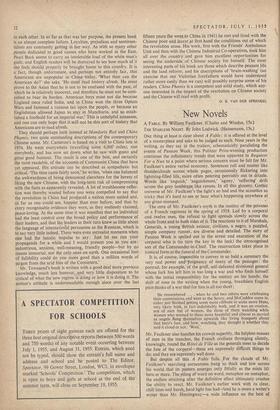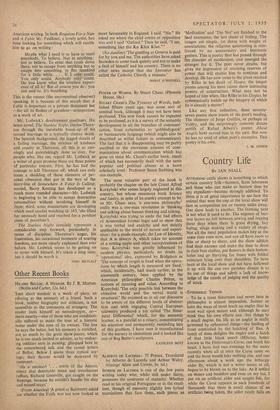New Novels
ONE thing at least is clear about A Fable: it is offered at the level of a masterpiece and asks to be judged as such. Nine years in the writing, as they say in the trailers, schematically paralleling the events of Passion Week, this Pulitzer Prize-winning production continues the inflationary trends that were apparent in Requiem For a Nun to a point where serious concern must be felt for Mr.
Faulkner's entire verbal economy. Sentences roll and mutter like thunderclouds across whole pages, occasionally flickering into lightning-filled life, more often petering peevishly out in drizzle. Words like 'anguish,' anguishment,"agony,"suffering' drift across the grey landscape like ravens. In all this gloomy, Gothic universe of Mr. Faulkner's the light's so bad and the acoustics so tricky that it's hard to see or hear what's happening anywhere at any given moment. • The core of Mr. Faulkner's myth is the mutiny of the privates of a French regiment in the spring of 1918. Led by a corporal and twelve men, the refusal to fight spreads slowly across the whole front and to both sides of it. The reactions to it of Marshals, Generals, a young British aviator, civilians, a negro, a puzzled, simple company runner, are diverse and detailed. The story of Passion Week is spelled out in the arrest and execution of the corporal who is (to turn the key in the lock) the unrecognised son of the Commander-in-Chief. The resurrection takes place in ironical form at the funeral of the Commander.
It is, of course, impossible to convey in so bald a summary the very real power and poignancy of many of the passages : the portrait, for example, of the gruff, self-defeated divisional general whose hick has left him in too long a war and who finds himself with the initial responsibility for the mutiny on his hands; the shift of tone in the writing when the young, breathless English pilot thinks of a war that for him is all too short :
He remembered . . . when he and two others were celebrating their commissions and went to the Savoy, and McCudden came in, either just finished getting some more ribbons or some more Huns, very likely both, in fact indubitably both, and it was an ovation, not of men but of women, the three of them watching while women who seemed to them more beautiful and almost as myriad as angels flung themselves upwards like living bouquets about that hero's feet; and how, watching, they thought it whether they said it aloud or not : 'Wait.'
Mr. Faulkner also handles his crowds superbly, the helpless masses of men in the trenches, the French civilians thronging silently,
knowingly, round the Hotel de Ville as the generals meet to decide the fate of the corporal—these are supremely difficult things to
do; and they are supremely well done.
But despite all this A Fable fails. For the clouds of Mr.
Faulkner's searching earnestness hang so thick and low across his world that its pattern emerges only fitfully as the mists lift
here or there. The piling of word on word, metaphor on metaphor, the endless straining after the definitive effect ultimately crushes the ability to react. Mr. Faulkner's earlier work with its clear,
chill lines and harsh, hard light has had—land he is more a writer's writer than Mr. Hemingway—a wide influence on the best of
American writing. In both Requiem For a Nun and A Fable Mr. Faulkner, a lovely artist, has been looking for something which will enable him to go on writing: Maybe what I need is to have to meet somebody. To believe. Not in anything: just to believe. To enter that room down there, not to escape from anything but to escape into something, to flee mankind for a little while. . . . If I only could. You only could. Anybody only could. Do you know what the loveliest experi- ence of all is? But of course you do : you just said .so. It's breathing.
This is the runner (the uncommitted observer) speaking. It is because of this search that A Fable is important as a private document but —for all its flashes of grandeur—unimportant as a work of art.
Mr. Lodwick's development continues. His latest novel, The Starless Night, carries Thorn- ton through the inevitable break-up of his second marriage to a typically clumsy death. The Spanish background, the jagged details of a failing marriage, the mixture of kindness and cruelty in Thornton, all this is as cun- ningly and painstakingly done as ever. For people who, like me, regard Mr. Lodwick as a writer of great promise there are three points of particular interest. First, he has had the courage to kill Thornton off; which can only mean a shedding of those elements of per- sonal obsession that got in the way of the story-line of Somewhere A Voice Is Calling; second, Barry Keating has developed as a much more rounded character—Mr. Lodwick is beginning to be able to accept destructive personalities without involving himself in them; third, some mannerisms are developing which need careful watching (p. 183, 'she lifted her unsteady hand and reached for a pendant piece of porcelain').
The Starless Night certainly represents a considerable step forward, particularly in terms of discipline. Thornton's anger, his frustration, his occasional moments of soaring freedom, are more clearly explained than ever before. Mr. Lodwick seems to be getting on to terms with himself. It's taken a long time; but it should be worth it.















































 Previous page
Previous page